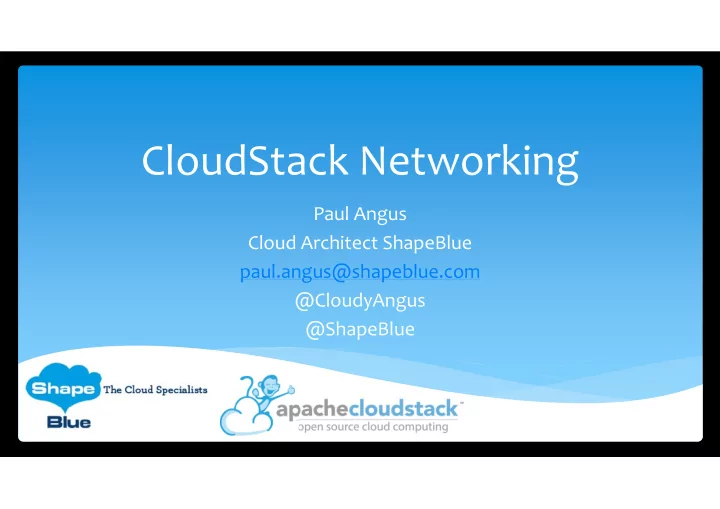

CloudStack Networking Paul Angus Cloud Architect ShapeBlue paul.angus@shapeblue.com @CloudyAngus @ShapeBlue
About Me Cloud Architect with ShapeBlue Worked with CloudStack since 2.2.13 Specialising in deployment of CloudStack and supporting infrastructure Orange, TomTom, PaddyPower, Ascenty, BSkyB, SunGard, T ‐ Mobile I view CloudStack from a ‘What can cloud consumers practically do with it’ point ‐ of ‐ view @ShapeBlue #CloudStack #CCCNA14
About ShapeBlue “ShapeBlue are expert builders of public & private clouds. They are the leading global CloudStack / CloudPlatform integrator & consultancy” @ShapeBlue #CloudStack #CCCNA14
@ShapeBlue #CloudStack #CCCNA14
Why NaaS – The Use Cases VPS Cloud NaaS @ShapeBlue #CloudStack #CCCNA14
CloudStack Networking Logical Networking Models Basic Advanced @ShapeBlue #CloudStack #CCCNA14
Basic Networking AWS Style L3 isolation – Massive Scale Simple Flat Network Each POD has a unique CIDR Optional Guest Isolation via Security Groups Optional NetScaler Integration ‐ Elastic IPs and Elastic LB Optional Nicira NVP Integration @ShapeBlue #CloudStack #CCCNA14
Security Groups Isolate traffic between VMs Available for both Basic and Advanced Networking XenServer must use Linux Bridge and not Open vSwitch xe ‐ switch ‐ network ‐ backend bridge Edit sysctl to enable net.bridge.bridge ‐ nf ‐ call ‐ iptables and net.bridge.bridge ‐ nf ‐ call ‐ arptables Must be implemented before adding to CloudStack @ShapeBlue #CloudStack #CCCNA14
Security Groups Rules can be mapped to CIDR or another Account/Security Group @ShapeBlue #CloudStack #CCCNA14
Advanced Networking This network model provides the most flexibility in defining guest networks and providing custom network offerings such as firewall, VPN, Load Balancer & VPC functionality. Guest isolation is provided through layer ‐ 2 means such as VLANs or SDN technologies @ShapeBlue #CloudStack #CCCNA14
Advanced Networking Private and Shared Guest Networks Multiple Physical Networks Virtual Router for each Network providing: DNS & DHCP Firewall Client VPN Load Balancing Source / Static NAT Port Forwarding @ShapeBlue #CloudStack #CCCNA14
Advanced Networking & Security Groups Effectively enables the deployment of multiple ‘Basic’ style networks which use Security Groups for isolation of VMs, but with each Network encapsulated within a unique VLAN. @ShapeBlue #CloudStack #CCCNA14
Management Network Traffic between CloudStack Management Servers and the various cloud components (Hosts, System VMs, Storage*, vCenter etc) @ShapeBlue #CloudStack #CCCNA14
Guest Network – Basic & Advanced @ShapeBlue #CloudStack #CCCNA14
Guest Network – Basic Zone EIP / ELB @ShapeBlue #CloudStack #CCCNA14
Public Network – Basic & Advanced @ShapeBlue #CloudStack #CCCNA14
Public Network – System VMs CPVM, SSVM & VRs have a connection to the Public Network *VRs only have public connection in Advanced Network @ShapeBlue #CloudStack #CCCNA14
Storage Network @ShapeBlue #CloudStack #CCCNA14
Physical Connectivity @ShapeBlue #CloudStack #CCCNA14
Basic Zone – Example IP Schema @ShapeBlue #CloudStack #CCCNA14
Advanced Zone – Example IP Schema @ShapeBlue #CloudStack #CCCNA14
Network Service Providers A Hardware or Virtual Appliance that provide Network Services to CloudStack e.g. Virtual Router Midokura Midonet VPC Virtual Router BigSwitch Vns Internal LBVM Cisco VNMC Citrix NetScaler Baremetal DHCP* F5 Load Balancer Baremetal PXE* Juniper SRX Firewall Palo Alto* Nicira Nvp Ovs (GRE/VXLAN) *new in 4.3 @ShapeBlue #CloudStack #CCCNA14
Virtual Private Clouds (VPC) Private multi ‐ tiered Virtual Networks ACLs to control traffic isolation Inter VLAN Routing Site ‐ 2 ‐ Site VPN Private Gateway VPC ‐ 2 ‐ VPC VPN* User VPN* *new in 4.3 @ShapeBlue #CloudStack #CCCNA14
VPC Components Virtual Router – Connects all the VPC Components Network Tiers – Isolated Networks, each with unique VLAN and CIDR @ShapeBlue #CloudStack #CCCNA14
VPC Components Public Gateway @ShapeBlue #CloudStack #CCCNA14
VPC Components Site ‐ 2 ‐ Site VPN Linked to Public Gateway @ShapeBlue #CloudStack #CCCNA14
VPC Components User VPN Linked to Public Gateway @ShapeBlue #CloudStack #CCCNA14
VPC Components VPC ‐ 2 ‐ VPC VPN Linked to Public Gateway @ShapeBlue #CloudStack #CCCNA14
VPC Components Private Gateway Created by Root Admins Configured by Users (Static Routes) @ShapeBlue #CloudStack #CCCNA14
VPC Components @ShapeBlue #CloudStack #CCCNA14
VPC Components @ShapeBlue #CloudStack #CCCNA14
VPC Components @ShapeBlue #CloudStack #CCCNA14
Communication Ports @ShapeBlue #CloudStack #CCCNA14
Recommend
More recommend